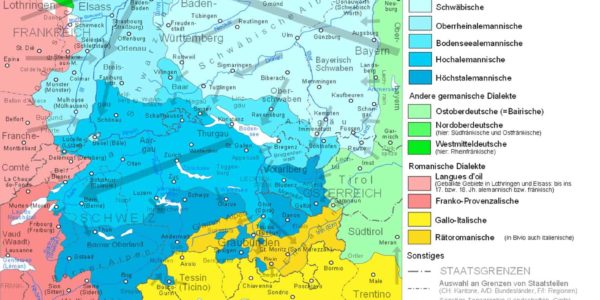On 13 November 2023, the Alemannic Wikipedia will turn 20. To mark this anniversary, its community has declared November a month of action and invites you to a meeting in Friedrichshafen on 19 November.
The “als:Wikipedia”, as it is listed in the Wikiverse, is one of 316 language versions of Wikipedia and has numerous exciting stories and articles in store. It is a wonderful resource for a dialect that is spoken and cultivated beyond the borders of Switzerland into Alsace, southern Germany and parts of Austria. One of the authors, Holder, gives an insight in an interview with Wikimedia CH and invites us to join in.
Hi Holder, can you tell us how this language version of Wikipedia came to be?
Holder: In September 2003, Alexis Dufrenoy, an Alsatian computer scientist, asked the Wikimedia Foundation in the USA whether it would also be possible to create a Wikipedia in Alsatian. This started a heated debate in the Internet community: Do we now also need a Wikipedia in all dialects? It was not until Wikipedia founder Jimmy Wales personally intervened in the discussion and spoke out in favor of its creation that the way was cleared for the “Alsatian Wikipedia”. In the first year, however, little happened in this Alsatian Internet encyclopedia: Dufrenoy was meanwhile working in Paris and had not found the time to write articles in Alsatian. Since no other Alsatians could be found either, the Alsatian Wikipedia was in danger of ending before it had really come to life. But now other dialect fans discovered this project: “Chlämens” from Rheinfelden in Baden, “Melancholie” from Allgäu in Bavaria, “J. ‘mach’ Wust” from Bern. They proposed to expand the Alsatian Wikipedia into an encyclopedia of all Alemannic dialects. Thus, in November 2003, the “Alsatian Wikipedia” became the “Alemannic Wikipedia”.
Are there any anecdotes, particularly successful articles?
Holder: One of the most beautiful stories I have experienced in the Alemannic Wikipedia is the following: A few years ago, I wrote an article about the village of Saderlach, a village in the Romanian Banat, where Alemannic was spoken until recently, as the village was founded in the 18th century by settlers from the southern Black Forest. Since there were no pictures from Saderlach on Wikimedia Commons, I asked the association of the former Saderlachers, the “Heimatortgemeinde Saderlach (HOG)”, if they could provide photos for Wikipedia under a free license. Besides I also asked if someone of them could translate the article into the old dying dialect of Saderlach. I didn’t get any pictures under free license, butTheresia Weisenberger from the HOG got to work and translated the whole article into Saderlach. Since I still had no photos, I also asked on the Romanian Wikipedia, if someone could take photos there. And indeed someone from Timișoara came forward, who then drove to Saderlach and took many photos. Now there is a nice article about Saderlach, which is much more extensive than the corresponding Wikipedia articles in German or in Romanian, with new photos and in addition in the old dialect of Saderlach.
How many users are writing here?
Holder: Today, Alemannic Language Version comprises a narrower circle of perhaps five to ten authors who are active. Over the course of 20 years, however, hundreds more have contributed articles from all areas of the Alemannic language region. Thus, the Alemannic Wikipedia contains articles in Züritüütsch, in Bärndütsch, in Wallisertiitsch, in Vorarlbergerisch, in Markgräflerisch, in Schwäbisch, and in Elsässisch. Even from the Italian Piedmont, a user has contributed articles, written in the Walser dialect of the small village of Alagna Valsesia.
How do the writers and readers of standard German react to your articles? Are they interested in your work at all?
Holder: We rarely get direct feedback from readers, nor do we know much about how often our articles are read, whether they are actually read or who reads them. However, we have collected feedback written on other language versions of Wikipedia or elsewhere on the Internet for several years, and it has shown that the feedback has been overwhelmingly positive.
And how do you deal with the fact that so many different dialect variations of Alemannic exist and that there are no clear rules for spelling in Schwitzerdütsch?
Holder: Everyone can write in their own dialect, and we don’t set any spelling rules. Most, however, base their spelling on dialect literature.
What does it take to participate?
Holder: You only have to know an Alemannic, e.g. a Swiss German, dialect, that’s all you need. The technical hurdles to writing in Wikipedia are quite low, you learn quickly. And with the other rules, you quickly get support and help from people in the Wikipedia community.
Thank you very much for your answers, Holder. We wish you a lot of fun in the action month of November and continue to enjoy.
Good to know
- The Alemannic community has a Wikipedia regulars’ table. You are welcome to join!
- Wikimedia CH supports the meeting in Friedrichshafen. Swiss Participants who contribute to Wikipedia or other Wiki projects, can ask for reimboursment of the travelling costs via an Expense Report.
Map: MlibFR, based on a deriative work of Testtube and Holder, Charte Alemannisch korrigiert 5, CC BY-SA 4.0




